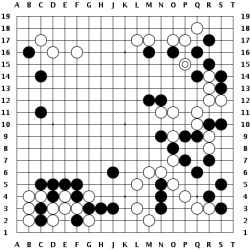 The recent victory scored by the AlphaGo computer system over a professional Go player might be more important than it seems.
The recent victory scored by the AlphaGo computer system over a professional Go player might be more important than it seems.
At first sight it seems like another milestone on a pretty well-mapped road; significant but not unexpected. We’ve been watching games gradually yield to computers for many years; chess notoriously, was one they once said was permanently out of the reach of the machines. All right, Go is a little bit special. It’s an extremely elegant game; from some of the simplest equipment and rules imaginable it produces a strategic challenge of mind-bending complexity, and one whose combinatorial vastness seems to laugh scornfully at Moore’s Law – maybe you should come back when you’ve got quantum computing, dude! But we always knew that that kind of confidence rested on shaky foundations; maybe Go is in some sense the final challenge, but sensible people were always betting on its being cracked one day.
The thing is, Go has not been beaten in quite the same way as chess. At one time it seemed to be an interesting question as to whether chess would be beaten by intelligence – a really good algorithm that sort of embodied some real understanding of chess – or by brute force; computers that were so fast and so powerful they could analyse chess positions exhaustively. That was a bit of an oversimplification, but I think it’s fair to say that in the end brute force was the major factor. Computers can play chess well, but they do it by exploiting their own strengths, not by doing it through human-style understanding. In a way that is disappointing because it means the successful systems don’t really tell us anything new.
Go, by contrast, has apparently been cracked by deep learning, the technique that seems to be entering a kind of high summer of success. Oversimplifying again, we could say that the history of AI has seen a contest between two tribes; those who simply want to write programs that do what’s needed, and those that want the computer to work it out for itself, maybe using networks and reinforcement methods that broadly resemble the things the human brain seems to do. Neither side, frankly, has altogether delivered on its promises and what we might loosely call the machine learning people have faced accusations that even when their systems work, we don’t know how and so can’t consider them reliable.
What seems to have happened recently is that we have got better at deploying several different approaches effectively in concert. In the past people have sometimes tried to play golf with only one club, essentially using a single kind of algorithm which was good at one kind of task. The new Go system, by contrast, uses five different components carefully chosen for the task they were to perform; and instead of having good habits derived from the practice and insights of human Go masters built in, it learns for itself, playing through thousands of games.
This approach takes things up to a new level of sophistication and clearly it is yielding remarkable success; but it’s also doing it in a way which I think is vastly more interesting and promising than anything done by Deep Thought or Watson. Let’s not exaggerate here, but this kind of machine learning looks just a bit more like actual thought. Claims are being made that it could one day yield consciousness; usually, if we’re honest, claims like that on behalf of some new system or approach can be dismissed because on examination the approach is just palpably not the kind of thing that could ever deliver human-style cognition; I don’t say deep learning is the answer, but for once, I don’t think it can be dismissed.
Demis Hassabis, who led the successful Google DeepMind project, is happy to take an optimistic view; in fact he suggests that the best way to solve the deep problems of physics and life may be to build a deep-thinking machine clever enough to solve them for us (where have I heard that idea before?). The snag with that is that old objection; the computer may be able to solve the problems, but we won’t know how and may not be able to validate its findings. In the modern world science is ultimately validated in the agora; rival ideas argue it out and the ones with the best evidence wins the day. There are already some emergent problems, with proofs achieved by an exhaustive consideration of cases by computation that no human brain can ever properly validate.
More nightmarish still the computer might go on to understand things we’re not capable of understanding. Or seem to: how could we be sure?



 I was interested to see this Wired
I was interested to see this Wired  Ah, the oft-promised passing of the Turing Test. Wake me up when it happens – we’ve been round this course so many times in the past.
Ah, the oft-promised passing of the Turing Test. Wake me up when it happens – we’ve been round this course so many times in the past.